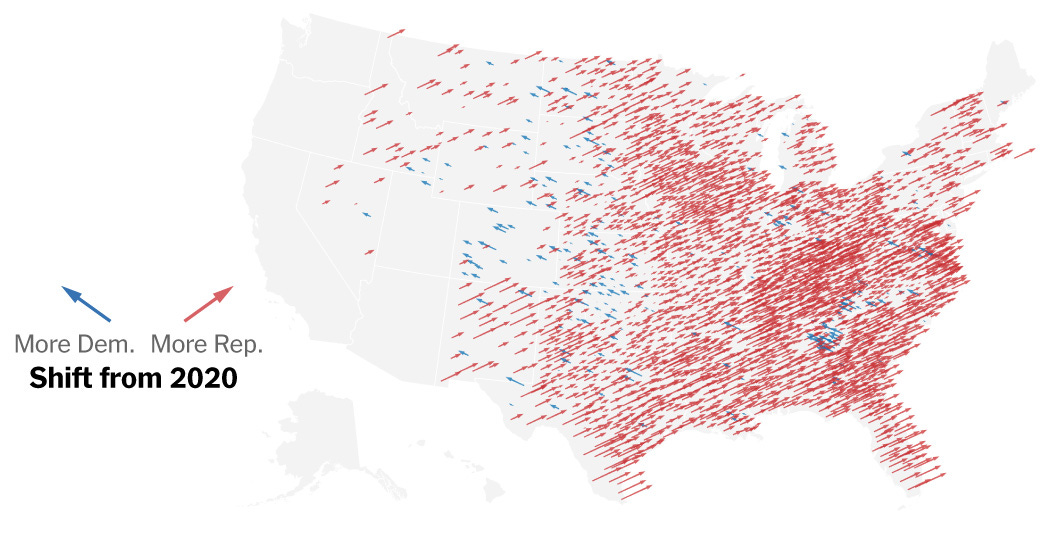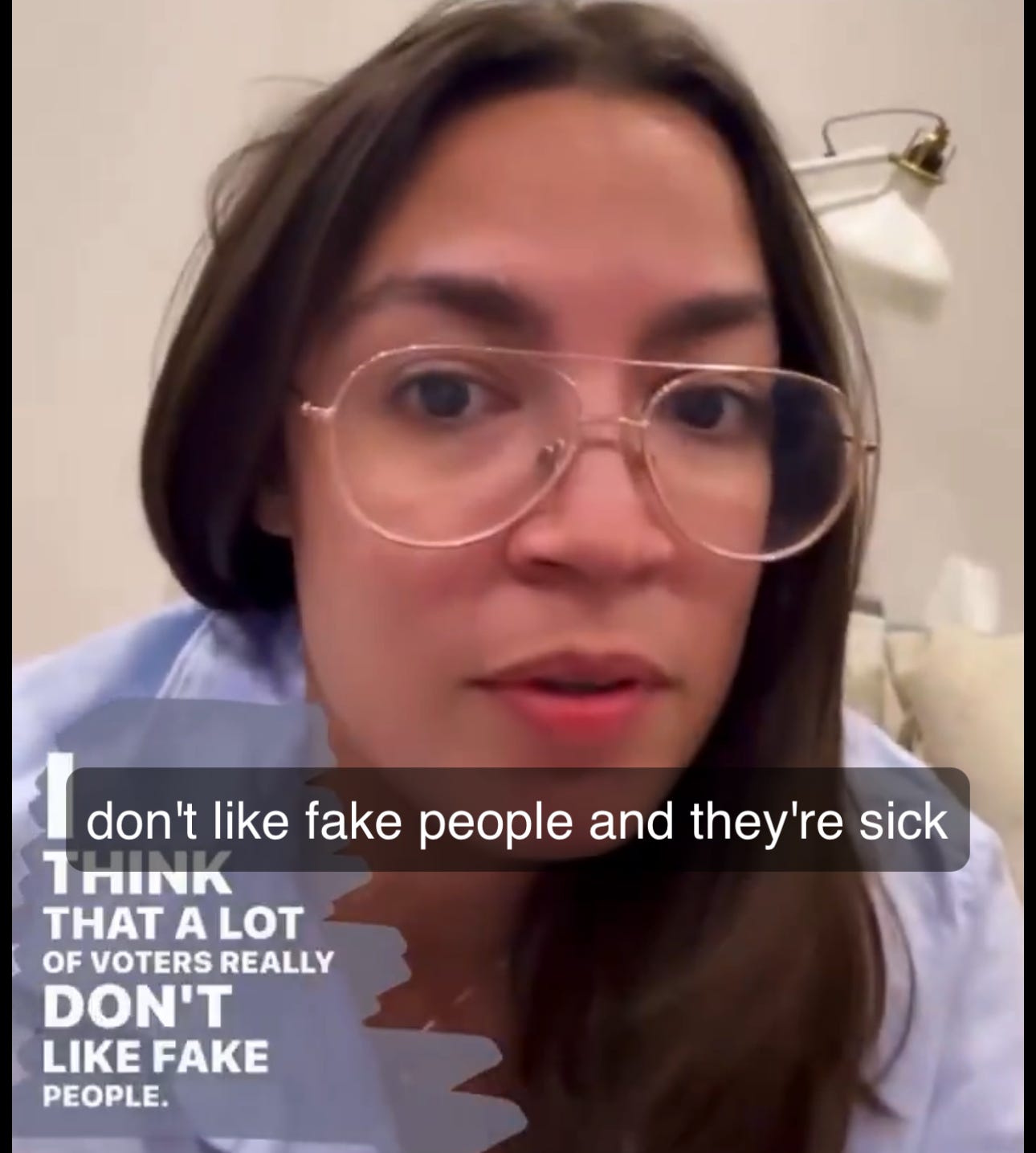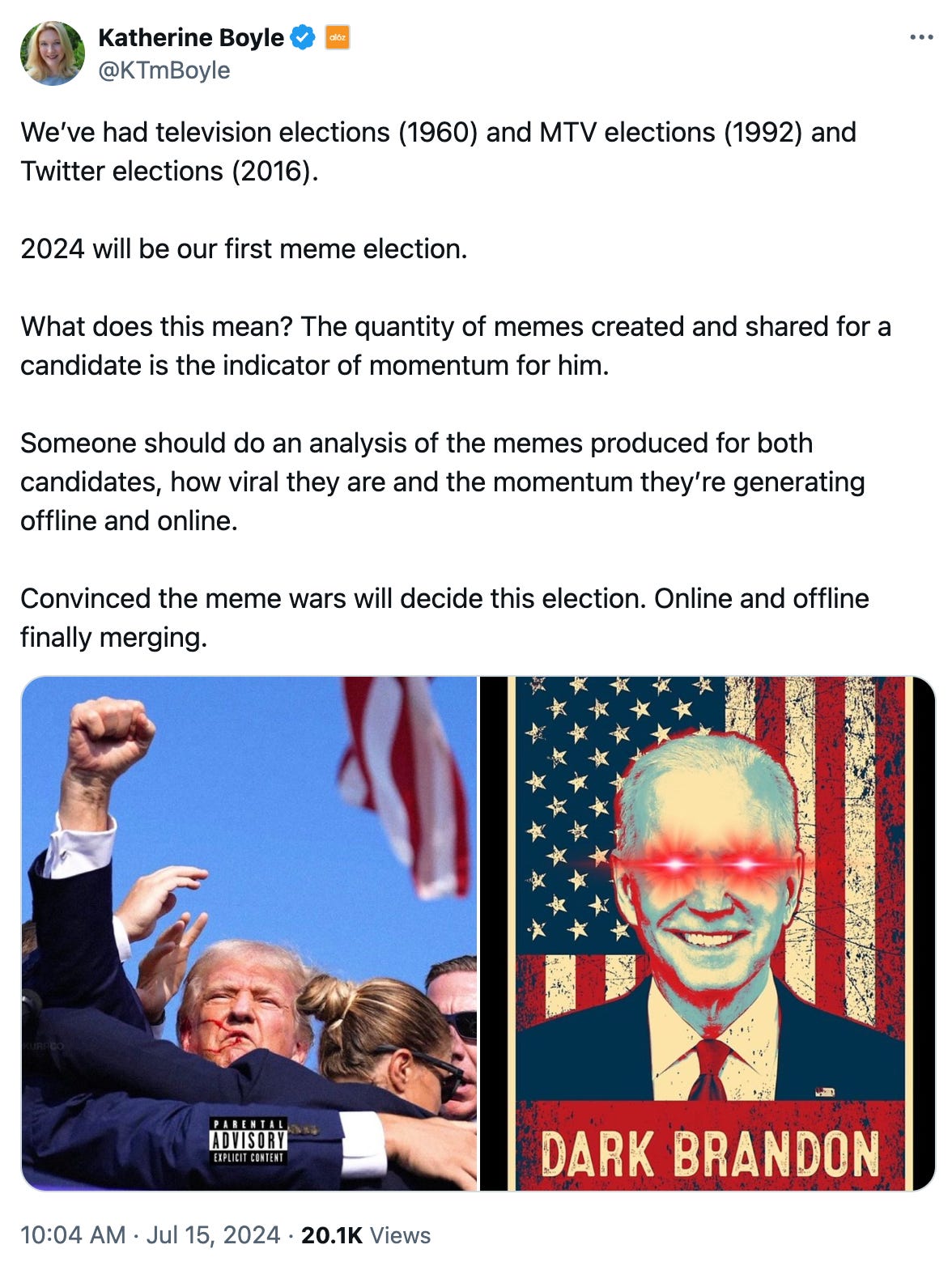There's a shift happening right now. A disturbance in the force. Do you feel it? It's hard not to, but it's not just the conservative rightward red wave some are describing. I mean that's true too — just look at this map:

Republicans swept everything. Popular vote, House, Senate. Game, set, match.
The vibes have shifted. I said last week that you should vote based on vibes, but this shift is more than just a feeling. It's about how we interact with reality.
In the week before the election, all of the pollsters basically called the election a draw. Nate Silver ran 80,000 simulations and came out with 40,012 for Kamala. But Polymarket and the other betting markets had a different story. They all favored Trump about 2 to 1.
Betting market are new, but the idea that incentives drive prediction ability is not. Philip Tetlock has run forecasting groups like The Good Judgement Project for years. Polymarket started in 2020 and lets users put up money on what they think will happen. The traditional intelligentsia have largely discounted them compared to pollsters, the idea being that to make big money on a betting market one must focus on unlikely events with stronger odds. If you had hidden knowledge on an issue with long odds, you'd be able to use that knowledge and have a market edge. This is why markets are so good at price discovery, and why prices sometimes jump around when new knowledge is released (like quarterly earnings).
The central idea of a betting market is powerful: you put up money on what you think the outcome will be. Not on what you want it to be. One of the problems with pollsters is the willingness for those polled to state their preferences - e.g. who they voted for. Timur Kuran coined this general problem "preference falsification" and I can think of no better example of it than voting for Trump. Half the people who voted for Trump didn't want to tell anyone they voted for Trump!
One French user named Théo found an edge in the election market. He looked at polling data that included neighbor methods. That is, the pollster didn't just ask people who they voted for, it also asked who they believed their neighbor voted for. And there was a difference here. The direct polls were very close, but more people believed their neighbors would vote for Trump.
Théo used this and put down a $30mm bet that Trump would win the popular vote on Polymarket, something that few expected. He walked away with $50mm in profit.
WSJ interviewed him after his win. Academics are now debating the credibility of his methods, and they're right to be skeptical. But Théo's primary insight was that there was a clear distinction between what people were saying publicly and what they would do privately in the voting booth. He found the signal, pitted true preferences against stated preferences, and won the bet.
There are few preferences more commonly falsified than voting for Trump. But as soon as he won, more people were willing to say they voted for him. The facade broke and a flood of true preferences came out. The shift was visible on the prediction markets first.
For at least a decade, there's been a big gap between public performance and private action. After years of carefully curated social media identities and performative activism, we're seeing an appetite for authenticity emerge. Trump, for whatever else he is, represents authenticity, as do those in the circle around him.
Could this election have happened 20 years ago? It's an interesting question. Back in 2004, political candidates had to be distinguished and polished at all times. They communicated through rehearsed sound bytes and moderate chyrons on the big TV networks. There wasn't any other way.
When Martin Gurri wrote The Revolt of the Public in 2013 he explained how the internet opened up the information pipelines. We've gone from a handful of curated media streams to an explosion of data and subjective unfiltered opinion smeared all over the internet. Katherine Boyle claimed this was the first meme election.
The first person this makes me think about is Elon. People who misunderstand him think he's bad at PR. But he's actually a Memelord, and not just the funny and sometimes offensive memes. He is notorious for harebrained ideas that actually get built. Neural implants. Landing rockets. Self-driving electric cars. Starlink. Robots. And now, a second Trump term. These are all memes — ideas that go viral and become reality.
Elon has said that the job of SpaceX is "converting the impossible to simply late." Making the impossible late starts with a good story and there is nobody better at coming up with a compelling story about the future and gathering resources to make it happen.
We have been a remarkably performative culture for almost a decade, ever since social media gave us an outlet to act out our every impulse for an audience. Cry sessions on TikTok, shutting down traffic for climate, throwing soup on paintings — none of these are meant to advance the world. They're meant to make a statement. They tell a story about the way the world should move. They don't help it move much, but there is a future vision of a world full of empathy and empty of oil.
The narrative change is striking. For several years everything has had a cast over it, like the aged craquelure that veils a painting. You know it's beautiful, but you can't really see it. Now this week feel like a burst of sun after a storm. Nothing has changed. The market and political fundamentals are pretty much the same. But the vision that's taken over now has action behind it rather than complacency. As Elon said about failure, it's irrelevant unless catastrophic; the goal is maximizing net output. Elon and Marc Andreesen and Tom Homan and Trump are not acting out on a stage, they are taking action. They're acting on a vision.
Suddenly the local maxima matter less and the area under the curve matters more.
You may not like the Trump vision. You may hate it and think it's the wrong direction. There is the predictable gnashing of teeth and racism and misogyny from the far left and The View. There's a blue bracelet and 4B movement. But these seem like sideline crowds that no longer control the vibes. Woke-ism is dead and identity politics seems to be on its way out. Some of the far left will cling to it, but more and more of the pundits are coming out to say this stuff is stupid and doesn't make sense.
If you don’t like the current mandate, that's fine: provide a competing vision. Preferably one stronger than shaved head resistance, higher taxes, and decrying Trump votes as racist. And if these people are taking action and building, then your vision needs to be more than the performative bullshit we've seen for the last few years. The left is having a real moment of introspection. Everyone from the PodSaveAmerica bros to Ezra Klein to Matt Yglesias is taking a spin at a more moderate Democratic Party not dominated by class and identity warfare. What an amazing action for our country!
Once we move past the performative nonsense, one of my fundamental political beliefs is that the right lens to understand most policy debates is the distinction between strong link and weak link problems. One side prefers to focus on positive outliers and the other on negative outliers. As Adam Mastroianni insightfully describes, science funding is a strong link problem. You're looking for strong, dispositive results that advance a theory. FDA food safety, on the other hand, is a weak link problem. It doesn't matter how good the best food is, if the worst food poisons people, that's bad.
This election cycle was a hammer strike against a specific set of policy views. Prop 36 in California increased penalties for theft under $950 and drug crimes, reversing the soft regulation ushered in by Prop 47 a decade previously. Those against the reversal argued that it would cost billions and make California less safe.
California disagreed. They're tired of crime and drug markets in the streets. Every single California County voted for Prop 36. Crime is a weak link problem.
On the other hand, the economy is not weak link. As important as it is to have a strong social net and to help the less fortunate, what matters most for the economy is big wins. Cutting off those wins with unrealized cap gains and corporate taxes does nothing except centralize under a lower ceiling. Nobody articulated this better than Marc Andreesen and Ben Horowitz in their little tech agenda.
So if you're wondering why the market ripped on November 6th, it was the memes. It was because the markets knew that voters knew that the markets need to be left alone to rip. That strong links drive the economy.
How does all this add up? I don't really know. The preference cascade of the last week amount to a bunch of subtle changes. It’s an openness to being optimistic again. It's acceptance that other people might have different opinions and that's ok. It's the plurality of people peeling away the cultural layer that told them everything was an existential crisis. It's a focus on both merit along with empathy instead of trying to scold everyone into an empathy they don't feel. It's awareness that the world might change and that the future isn't just different, but maybe even better.
Don't get me wrong here, this could all still blow up tomorrow and not everything is rosy - really, Matt Gaetz for AG anyone? But what we've seen isn't just a political shift and it's not really about the future Trump administration. The country isn't suddenly right-wing conservative. What we're seeing is a realignment on how to tackle problems. People are tired of the virtue signaling they know is vacuous. They're tired of not revealing their true preferences for fear of being cancelled or ostracized. And they're tired of misaligned incentives that don't solve problems. It's not about how we feel, it's about how we act.
If the country becomes more willing to express itself without getting ostracized and to act without worrying about performing, the future is bright. Because there is nothing so powerful as America on the move.
Bullish.





